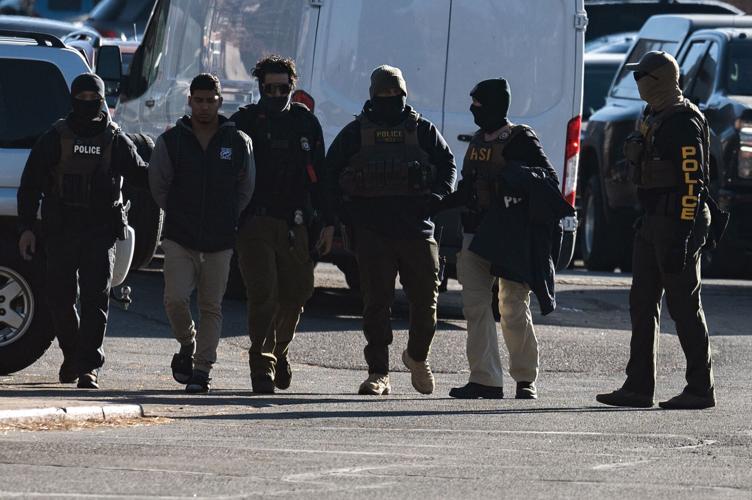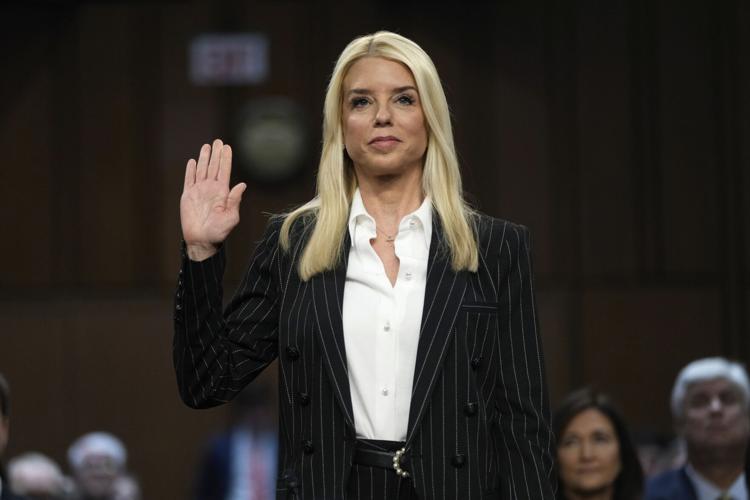DOJ to withhold grants from ‘sanctuary jurisdictions’
In one of her first acts, U.S. Attorney General Pam Bondi is halting the disbursement of funds from the U.S. Department of Justice to “sanctuary jurisdictions,” which could result in millions of dollars in federal funding withheld from Colorado.
“Unlawful border crossings and illegal migration into the United States have reached record levels, resulting in a substantial and unacceptable threat to our national security and public safety,” Bondi wrote in a Feb. 5 memo.
“To protect the American people from the effects of unlawful mass migration, President (Donald) Trump has prioritized securing our Nation’s borders and enforcing federal immigration laws. In furtherance of that objective, the Department of Justice will ensure that, consistent with law, ‘sanctuary jurisdictions’ do not receive access to Federal funds from the Department.”
A “sanctuary jurisdiction” is — broadly speaking — a designation given to municipalities and counties with policies that discourage local law enforcement from reporting an individual’s immigration status to federal authorities.
Gov. Jared Polis has routinely rejected that label, insisting Colorado is not a “sanctuary” state. But several groups identify Colorado as a “sanctuary” state.
The Lutheran Immigration and Refugee Service listed Colorado among 11 “sanctuary” states. Also on its list are California, New Mexico and New York.
The Center for Immigration Studies also included Colorado in its map of “sanctuary” jurisdictions. The group listed 14 areas in Colorado as “sanctuary” places, notably the city of Denver and Boulder County.
And the state adopted a 2019 law whose provisions fall under the broad outlines of what constitutes a “sanctuary” state. That law prohibits in specific instances cooperation with federal authorities on enforcing immigration laws.
Meanwhile, the Denver City Council in 2017 passed an ordinance that prohibits “city employees from collecting information on immigration or citizenship status; prohibits the sharing of any other information about individuals for purposes of immigration enforcement; and, memorializes predominant practices by prohibiting use of city resources or City cooperation with civil immigration enforcement.”
Boulder also voted to proclaim itself a “sanctuary” city, while other jurisdictions, such as Aurora, officially declared they are not.
If federal funds are, indeed, withheld, it’s unclear how much Colorado jurisdictions would lose.
The State Criminal Alien Assistance Program (SCAAP) alone reimbursed $2.7 million to 17 Colorado counties — including Adams, Arapahoe, Boulder, Douglas and Jefferson in the Denver metro area — in fiscal year 2024.
The jurisdictions in the Denver metro area were reimbursed about 80% of that, or $2.1 million, according to the Bureau of Justice Assistance data.
The SCAAP awards refer to federal payments to states and localities that incur correctional costs for incarcerating convicted individuals unlawfully living in the United States.
“If they’re getting paid for these illegal aliens being there, then why aren’t they sharing that information?” said John Fabbricatore, a former field office director for U.S. Immigrations and Customs Enforcement (ICE).
The way Fabbricatore sees it, if state and local agencies are receiving federal reimbursement to incarcerate criminals unauthorized to be in the U.S., then those government entities should report them to federal immigration authorities.
“It’s just a merry-go-round if they’re collecting money,” Fabbricatore said.
Jurisdictions across the nation received $144.9 million in SCAAP awards, federal data shows.
And that’s just one program.
Colorado has nearly 50 projects supported by $3.6 million for a variety of law enforcement intervention and prevention programs, according to the Colorado Division of Criminal Justice.
Local agencies were unable to say how many, if any, Department of Justice (DOJ) grants may be at play.
“It’s all speculative right now,” said Aurora City Councilwoman Danielle Jurinsky.
Jurinsky, who chairs Aurora’s public safety committee, said she is unsure what DOJ grants may be passed through the state.
Douglas County Sheriff Darren Weekly is not worried about the fallout.
“I’m not concerned about it because we’re not a ‘sanctuary’ county,” Weekly said.
Weekly added: “I don’t rely on grants to run our organization.”
A court challenge filed by Douglas County had targeted a 2023 law that restricts the ability of state and local governments from making agreements with federal immigration officials over the detention of immigrants who are unlawfully staying in the country, as well as the 2019 statute that blocks local law enforcers from arresting or detaining an immigrant solely on the basis of a federal immigration detainer.
The 2019 law also prohibits probation officers from providing “personal information about an individual to federal immigration authorities.”
A judge last month dismissed the case, concluding Douglas County did not have any standing to sue the state. The county said it plans to appeal.
Jon Ewing, a spokesperson for Denver Mayor Mike Johnston, said he did not know what the local impact could be of the DOJ withholding grants.
Ewing referred The Denver Gazette to the city’s finance department, which did not immediately respond to an email seeking comment.
Johnston rose to national prominence last year, becoming one of the faces of the humanitarian crisis that spilled into interior states like Colorado.
Others have continued to push back on the “sanctuary” label.
“Colorado is not a sanctuary state,” Shelby Wieman, a spokesperson for the governor’s office, said in an email to The Denver Gazette.
Wieman added: “The Department of Justice’s recent action would fly in the face of these goals should funding be withheld in Colorado or other states.
“Governor Polis has been clear that Colorado will continue to work in compliance with state and federal law, with federal law enforcement agencies in apprehending dangerous criminals to make Colorado safer for everyone.”
Republicans at the Colorado state Capitol are once more seeking to repeal the set of laws that bars cooperation with federal immigration authorities. At the same time, a group is targeting for repeal Colorado’s “sanctuary statutes.”
In the three weeks since resuming office, Trump has signed a flurry of executive orders withholding federal dollars — pending review — from various jurisdictions and organizations deemed by the administration to be at odds with its priorities or to be interfering with the “lawful exercise of federal law enforcement operations.”
Many of these actions — including a stop-work order to nonprofit organizations that provide basic legal information to immigrants facing deportation — are being challenged in court.
Two years ago, Denver began seeing an influx of immigrants from South and Central America coming to the Mile High City. Many likely crossed the southern border with Mexico illegally.
Since then, nearly 43,000 immigrants have come to Denver. Plane, train and bus tickets for immigrants suggest about half have stayed.
A significant number are from Venezuela, which has been mired in political and economic turmoil since Nicolás Maduro assumed power in 2013. Nearly 8 million Venezuelans have fled Maduro’s regime, with more than 500,000 estimated to be living in the U.S.
Denver alone has spent about $80 million in its response to the illegal immigration crisis, not counting funds from the state, as well as health care and educational expenses.











